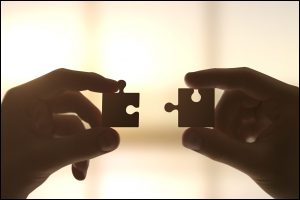
Over the last two weeks, we’ve been discussing our thoughts and belief systems around relationships and how we show up based on these beliefs. This week, I will share some archetypes that are common in relationships, and why we adopt these roles and help you begin to shift your relationships towards joy.
The Cycle of the Ego
1. On a sheet of paper, draw an upside-down triangle.
2. On the top left corner of the triangle, put the word “rescuer.”
3. On the top right corner, put the word “self-protector.”
4. At the bottom corner, write the word “victim.”
Notice these are the three parts of being in an egocentric relationship so you can identify where you and your relationships show up on this triangle. You will never stay at the same place on this triangle. You play these roles out for each other and project onto each other in your relationship.
Let me describe these positions on the triangle a little deeper.
The Victim in the relationship, has intense self-hatred, guilt, shame, and self-criticism. In this role we feel stuck and can’t take any action to help ourselves. It feels like there is no way out and we don’t see it because we feel helpless, dependent and we don’t like ourselves; we don’t see how we can change what is happening. This is the role where we blame, shame and make excuses, feeling like the person that is always hurt.
The Rescuer is the one who needs to feel powerful and in control. What they do is take care of other people in relationships so they feel they have some sense of control and power. Underneath, these people feel powerless, small and ashamed. By becoming the good guy (or gal), saving and protecting the other person from their bad stuff, it makes the rescuer feel good about themselves.
When we rescue people, we don’t allow the other person to experience their life for themselves. We are telling them they are powerless and need to be rescued. When you rescue someone, you are not honoring or respecting them, you are only trying to make yourself feel better.
Lastly, the Self-Protector avoids being a victim at all costs. First, by attacking, intimidating or belittling others. In an effort to protect themselves, this person preemptively attacks others before they get attacked.
Secondly, they self-protect through withdrawal and isolation. Like a turtle, they physically or emotionally shut others out to keep them from getting too close.
Observe how you and your partner in your relationships do this and think about where you each have shown up in these roles. Do you show up in all of the roles depending on the situation? Or do you recognize yourself as showing up predominately in one way. Why do we take on these roles? Pain.
This model I have just shared with you was put together by Essence of Being graduate and friend Melody Brooks and her book “Oh Wow, This Changes Everything!” shows how we keep going around this rescuing, self-protecting or being a victim cycle. It is a very painful way to have a relationship and is all about being in the ego.
What Can We Do?
We want to shift out of this model into another way of thinking and being in relationships. This includes any relationship in your life.
Examples of Egocentric Reactions
Victim: Your husband is telling you that the way you are putting your hand in the disposal to clear it is dangerous. You are perceiving this as evidence about how inadequate you are and you start to cry. At this point, you just ask your husband to do it for you.
Rescuer: Again, same situation about your husband saying that the way you are putting your hand in the disposal is dangerous. You perceive this as an attack and say, “Oh, yes, you’re right. You’re always so much smarter,” and you swallow your resentment. You are rescuing that person by not speaking up and resent them at the same time.
Self-Protector: Same situation where your husband tells you the way you are putting your hand in the disposal is dangerous. You perceive that as an attack and shout at him, “Hey, I can take care of this, I’m not stupid!”
Do you see yourself in the above? What about your partner? Stay tuned next week for our final installment in this series where I will take you through a powerful exercise in identifying and owning your feelings and shifting your relationships from pain to joy.

